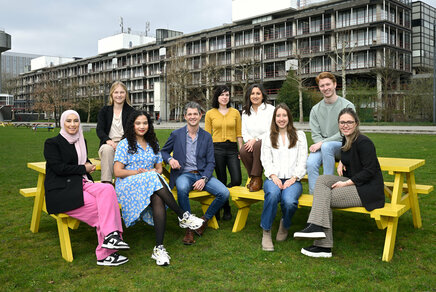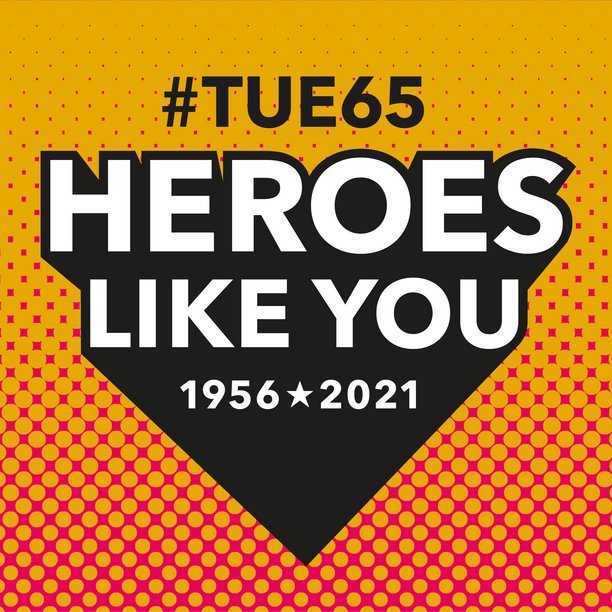Life in Eindhoven finally takes off for Minta and Ricardo
The ‘heroes of the month’ in December: the many internationals in our community. They struggled through the corona crisis far from their homeland and family.
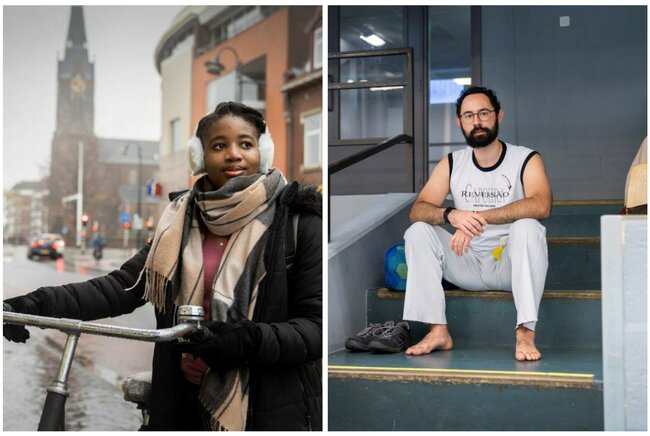
No longer are they ignoring the subject, or turning a deaf ear when it is raised by someone else. The Brazilian doctoral candidate Ricardo Alferes and student Minta Harris from Saint Lucia are happy to tell their story in order to help others. After all, it's nerve-wracking enough simply going to a university in a foreign country. If added to that you find yourself in a lockdown and cannot return home for nearly two years, troubling thoughts can get their hooks into you.
“It's like I'm in my first year at TU/e all over again, really it is,” says 21-year-old Minta Harris, second-year bachelor's student at the Department of the Built Environment. “Since we've been allowed back on campus, I've been getting to know the buildings and all the best spots. Like I've only just found out the name of this restaurant,” she says of Brownies&downies in Atlas, where we meet to talk.
“I am meeting new people, talking with them. I took part in activities in the Diversity Week in October. I was already a member of BNR Beurs, the student investment association, but we always met up online. Last month I've had my first ever beer on the campus, after a BNR Beurs meeting in Hubble. Seeing everyone for real was fantastic, but also exhausting. It's only now that I feel like I'm living the student life.”
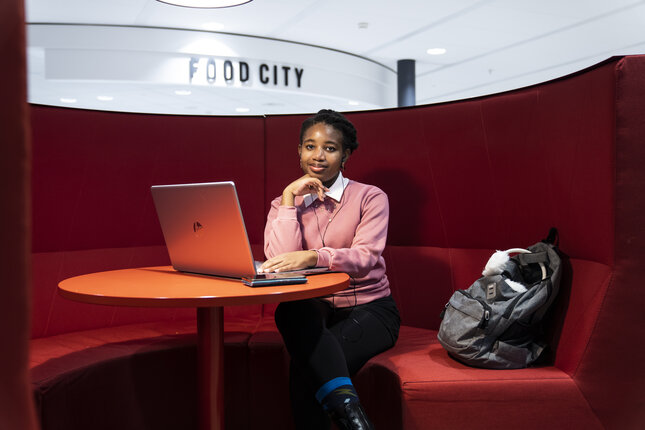
Game changer
The Brazilian doctoral candidate Ricardo Alferes (31) had a similar feeling of revelation when he joined the Student Sports Centre on the campus. “That was a real game changer for me. I found myself in a group with more expats, and I felt really welcome. After all those months in my room in Aurora I was back among people! It's absolutely true that sport is both physical and social. Of course the exercise makes you physically tired, but at the same time I get such an energy boost. And I regain that feeling of wanting to get on and do things.”
His golden tip for newcomers is, therefore, ‘join the sports centre’. “Don't underestimate how important it is to create a network around you. To find people you can do fun stuff with. I found that in the sports centre.”
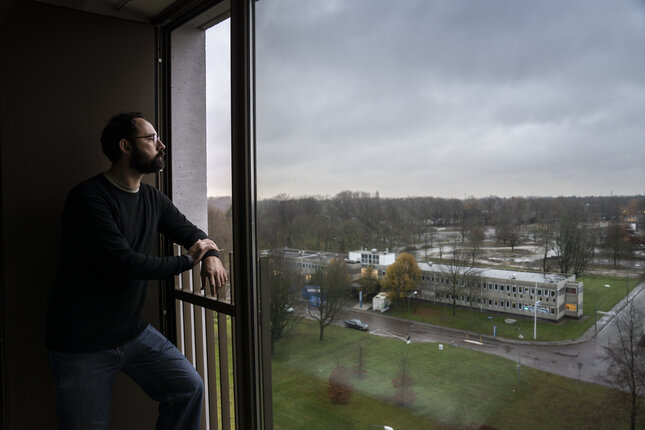
Lockdown blues
When we talk with Ricardo and Minta, they are both in a good place. Cheerful, positive and full of energy and plans. But during the lockdown it was a different story. In September 2020, they started their studies/doctorate in good spirits, but during the lockdown it was not easy to keep that good vibe alive.
From his room in Aurora on campus, Ricardo would have periods when he saw no one for days at a time. “To be honest, I only knew the campus as an empty space. It's only been since this past September that I've gained some idea of what the place looks like and what it's like when things are normal. There is life on the campus; Dutch Design Week and the GLOW light art festival brought a lot of people outdoors. Now for the first time I know there's always something to do here. That's fabulous to see.”
No normal start
Looking back, Ricardo knows that he didn't experience a normal start to his PhD period. “The corona crisis certainly had an impact on my work.” He researches the composition of the concrete mix used in the concrete printer to print things like the Milestone houses. “One of the things I study, is how we can make concrete printing more efficient, because concrete production is connected to a large amount of CO2 emission.” Ricardo’s research involves plenty of lab work, but access to these rooms was restricted during the corona crisis and users had to sign up in advance. “For some experiments I needed to come and take daily measurements, they couldn't wait. And if experiments didn't go as planned, you couldn't stick around and repeat them.”
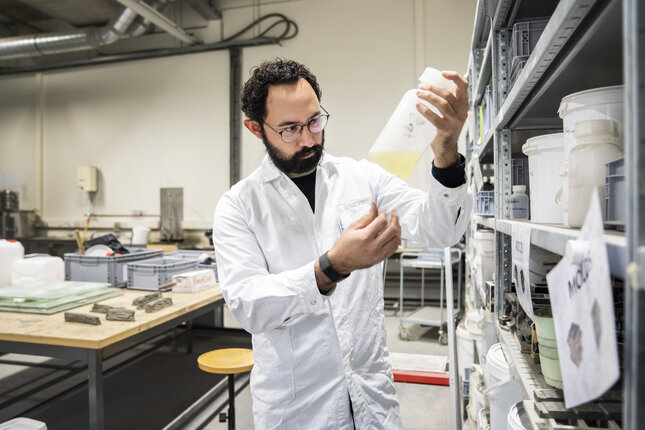
Sometimes days went by when I didn't speak to anyone. Then if I had to say something, my voice would desert me
Doctoral candidate Ricardo Alferes
But for Ricardo, the toll of working in isolation was largely mental: “You never just bump into a colleague who you have a chat with at the coffee dispenser and who sparks new ideas. It's just different online. Sometimes I would be in my room working for days at a stretch and seeing no one. Back then I'd joke to my friends that having spent entire days not speaking, when I had to say something my voice would be gone.”
Your own life
Although student Minta Harris started at TU/e while the corona crisis was well underway, life in Eindhoven and the ambiance in mid-July 2020 struck her as being reasonably relaxed. From her apartment in The Spot she was in charge of her life for the first time. “Quite a lot was possible at that time. You had to wear a mouth covering, but you could go to the zoo or a restaurant. When the academic year started, the rules got stricter. Lessons were mostly online; I was coming on to the campus only once or twice a week for a lecture. I'm someone who likes interaction, there's always more questions I want to ask, but all that was now off-limits. I didn't know the campus, didn't know any people. As a newcomer, it wasn't easy to make those connections.”
But she managed; she did her homework, followed lectures, took care of herself and her apartment. In December things became tougher for Minta: “I was working day and night towards the exams. Winter was setting in, and I was getting up in the dark and working through until late at night. I get so much energy from meeting people but in that period it just wasn't an option. I found it difficult to stay motivated, felt trapped in my apartment. I had even stopped doing this I loved, like talking walks or writing. I was suffering with the winter blues, but didn't know how to turn things around.”
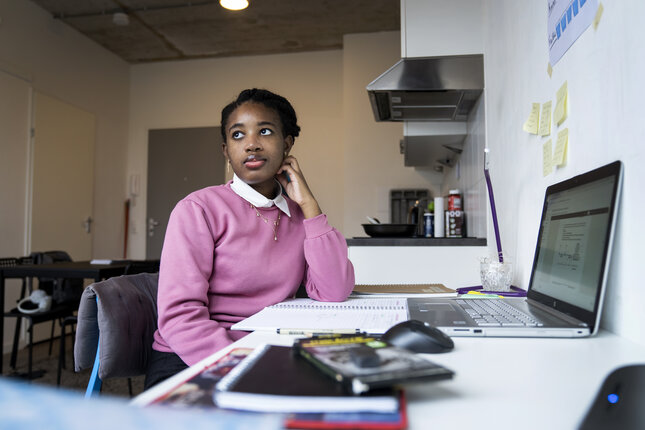
I was getting panic attacks. Was scared of going to the supermarket, scared of switching on the camera in online meetings
Minta Harris, bachelor's student Built Environment
It didn't help that her planned trip home, to the Caribbean island of Saint Lucia, in the 2020 Christmas vacation didn't go ahead. “I was so looking forward to seeing my parents and family, and my boyfriend, with whom I was having a long-distance relationship. The time difference with the Netherlands meant I rarely got to speak with them. I had spent all my money on Christmas presents, and then I heard that I couldn't travel home. I collapsed and cried for a week.”
From then on, things went from bad to worse. “January and February were dark and difficult for me. I was having trouble keeping up with my courses, stopped cleaning my house. Breakfast was the only meal I ate, I'd run out of money, I had stomach problems. I was getting panic attacks. I was scared of going to the supermarket, scared of switching on the camera in online meetings. And the weather wasn't helping. In Saint Lucia we don't have winter; we have good weather all year round.”
Mental help
She made an appointment to see a psychologist at TU/e. “We'd spoken back in the November when I was already feeling unwell. But I needed more support. She looked mostly at university-related matters, not at my personal problems, things the corona crisis was causing. It helped, but not enough, so I sought mental help outside the university.”
And those sessions did help; slowly but surely Minta climbed out of the depths. “When the measures eased up in the summer and we could come back on campus, things started going better with me.” That she was able to go home in July and August, almost two years after she had left, put a lot right. “Although I did have a culture shock - in reverse. I had forgotten how things are done on Saint Lucia, I'd got so used to the Dutch way of life in the meantime. But it felt so good. I felt like my old self. Who I was during the lockdown wasn’t me; and now I look back and see the difference.”
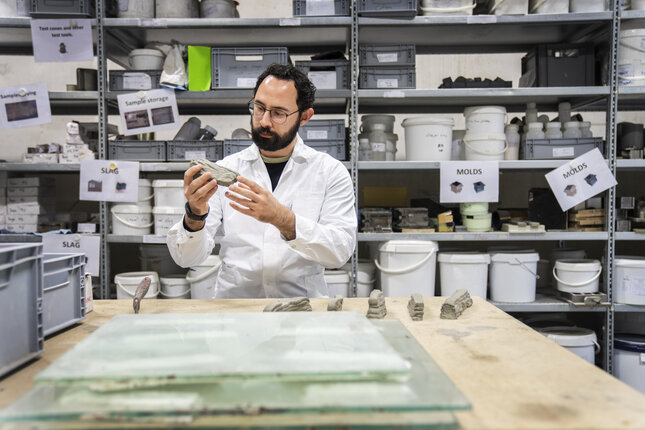
Friends
Without his friends, doctoral candidate Ricardo would not have pulled through, he has no doubt about that. “When I chose where I wanted to do my doctorate, the fact that a friend of mine was already studying at TU/e was a strong factor. Plus I had two friends that were living in Eindhoven. That turned out to be a wise move when everything closed down due to corona.” They acted as his lifeline in that dark period. “To me, they are the family I have chosen. They helped me with practical matters, like where do you buy food, what's the easiest way to get to the city center, where do you pick up medicine? But, above all, the mental support they gave me was invaluable. I don't know if I could have gotten through this without their support.”
“When I came to Eindhoven, the corona situation was really bad in Brazil. I couldn't even arrange to meet up normally with my friends to say goodbye. In Eindhoven I arrived in the summer of love, in a period with more freedom. That was quite a shock. My first weeks were pretty normal: I went to the lab, met my new colleagues.”
When the measures tightened up again, Ricardo’s daily life became a lot more lonely as working from home became mandatory. “You can imagine that I was hugely happy that I already had a couple of friends. But there were also days that I felt more than a little lonely. I do tend to have that anyway, but during the pandemic it was more frequent. So I went looking for help, and made an appointment with a psychologist at the university.”
It is so good to hear that you aren't the only one who is struggling. It makes it easier to accept.
Doctoral candidate Ricardo Alferes
These sessions helped him: “I was at the start of my PhD. The country, the university, my colleagues, the work; everything was new. I felt I couldn't work at a high enough standard because of corona and that made me feel guilty. Thanks to those sessions, I learned not to be so hard on myself. It helped me to see things from another perspective. When you spend so much time alone, the only input you have in your head is internal and you talk to yourself. When I was bold enough to talk with colleagues about my problems, I learned that they too had had problems in their first year. It is so good to hear that you aren't the only one. It makes it easier to accept.”
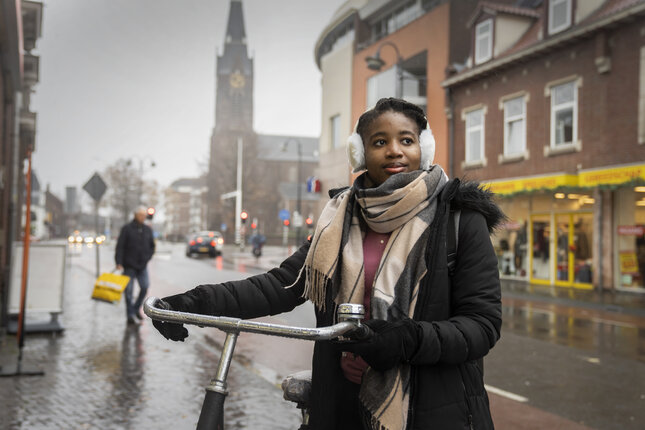
Future
Minta feels cheerful about the future. “I’m my old self again, I’ve let go of the fearful Minta.” Her boyfriend is now also at TU/e and has moved in with her. “My apartment felt so dark and empty, but now he's here. Having companionship is so important. And he's a good cook,” she jokes. “Now the idea of the corona measures in the Netherlands being tightened up doesn't worry me, because I know my pitfalls.”
Recently, the campus has opened up to her and she knows her way around, is meeting new people and is living the life of an international student that she initially imagined for herself.
“I hope I'll be completing my bachelor’s here in three-and-a-half years' time and after that I want to travel. See different places and cultures. And I want to carry on writing my fantasy trilogy. The first book has been written. I love writing and being creatively expressive. It's really for my own enjoyment. Being a writer by profession is not an aspiration of mine. It would suck out all the enjoyment. As an architect you are creating something for someone else, you are visualizing someone's wishes or vision. If you can do that, wow, that's for me.”
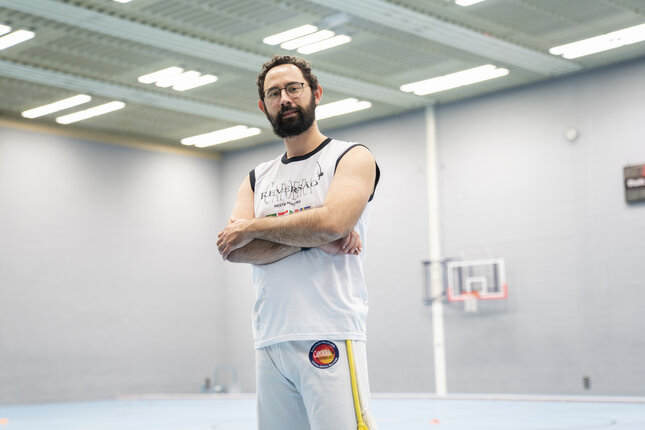
Enjoying life in Eindhoven
Ricardo now feels a whole lot better. “It was a combination of factors that led to my feeling so bad. It made a huge difference for me when the lockdown relaxed, I started getting increasingly comfortable with being a doctoral candidate, and I could go to the Student Sports Centre. I was among people more often, started being more active, felt more energetic.”
So he isn't worried about the winter: “I am a completely different person than I was last winter. I hope to go home at Christmas and visit my family. With hindsight this is much better timing; I am happy that they will see me feeling good about things. It is important for my parents to know that I'm doing well. I've not really shared with them that I had a rough time last year. They know that I had bad days, but there's no point telling them everything. It would only worry them, and it's not as if they can change anything. They'll soon be seeing their son who is well on track and happy; I'm enjoying life in Eindhoven.”
More on our strategy

![[Translate to English:] [Translate to English:]](https://assets.w3.tue.nl/w/fileadmin/_processed_/c/f/csm_BvOF_2024_0319_AEV_license_TUe_Dirk_van_Meer_-_CORE_1__c976e259a5.jpg)
